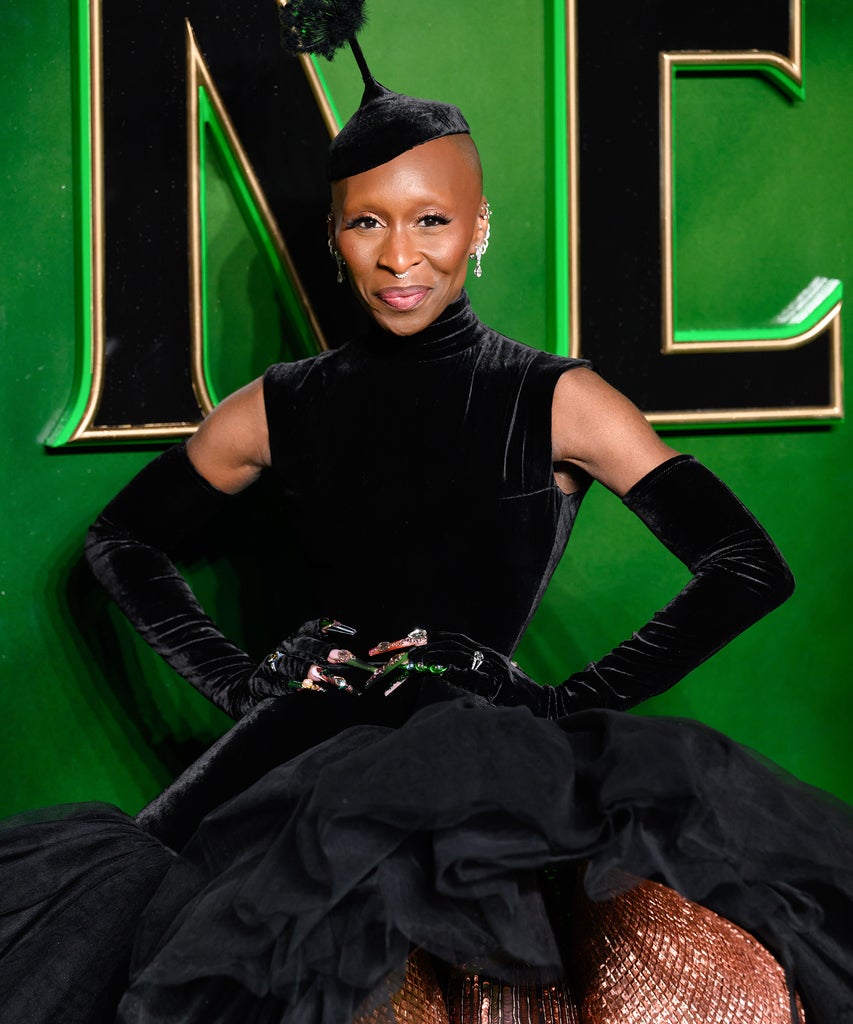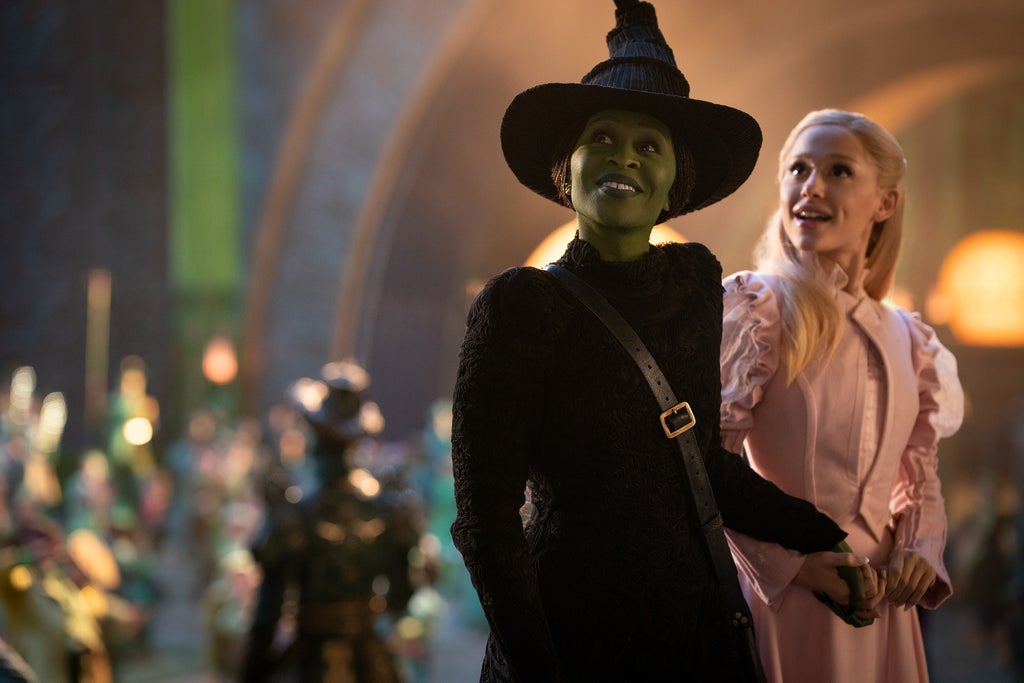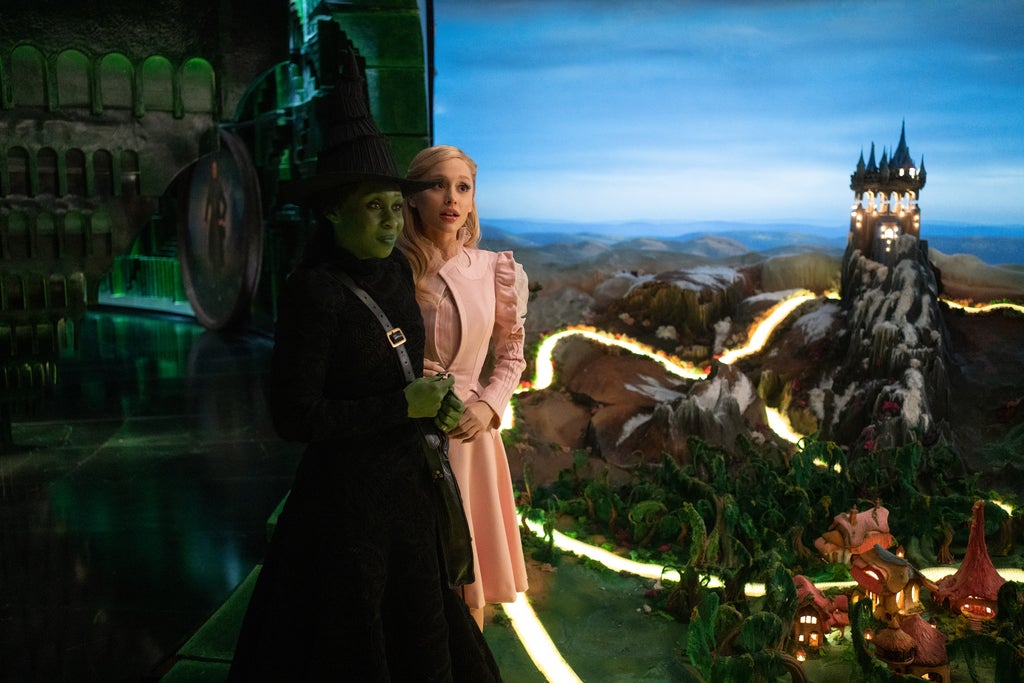
In the much-anticipated film adaptation of the iconic musical play Wicked, two powerhouse performers share the spotlight: Ariana Grande as Glinda and Cynthia Erivo as Elphaba. Yet when scanning British press coverage of the European premiere in London, one might be forgiven for thinking this was Grande’s solo venture, with the “Thank U, Next” singer’s photos making front-page news while Erivo is nowhere to be seen. The Daily Telegraph, The Times and The Daily Mail are among the newspapers that have been named and shamed for splashing Grande’s image all over their covers while leaving out Erivo. Similarly, headlines about Grande’s “new look”, backstage snapshots and poignant scenes in the “Ariana Grande movie” have been dominating the online news cycle in the UK — Erivo’s coverage being noticeably more peripheral.
The irony could not be starker, nor more thematically resonant with the story of Wicked itself. Erivo, a London-born performer of extraordinary calibre, portrays Elphaba – a character whose green skin makes her an outcast in Oz, overlooked and alienated despite her exceptional talents. This parallel becomes even more pointed when considering that Erivo stands just one Oscar away from achieving the coveted EGOT status, having already secured Emmy, Grammy, and Tony awards. Her journey from Stockwell to Hollywood and Broadway has been marked by groundbreaking performances and critical acclaim in projects like The Color Purple and Genius: Aretha. Yet, in her home country’s media landscape, she finds herself relegated to the shadows of her American co-star.
Some have defended this discrepancy by pointing to Grande’s more dominant celebrity status and cult following. But this argument only serves to highlight the media’s role in making or breaking a star. In turn, the disparity in focus on these two leads speaks to a broader, troubling pattern in British media: the systematic marginalisation of Black British talent, especially when it comes to Black women.

Indeed, Erivo has been vocal about her fear of being “erase[d]” throughout the project’s promo run, most controversially taking to Instagram to express deep hurt over a fan-edit of the film’s poster in which Erivo’s eyes are covered by her hat, mirroring the 1973 original. In the updated poster for the 2024 film, Erivo’s eyes are in full view, looking “right down the barrel of the camera” to the viewer, as the actress describes it. The star’s offence to both this and a popular AI-generated meme of Grande and Erivo’s characters fighting over an “is your p*ssy green?” question has left the internet confused and irritated, with many framing her response as an “overreaction” and “ruining the fun”.
While it’s easy to look at this incident in isolation and think of Erivo as overly sensitive, when understood in the context of the Emmy-award winner having had to deal with the media and Wicked fans alike minimising her role in the movie, when Elphaba is actually the most pivotal character in the narrative, her reaction makes more sense. “I haven’t necessarily paid attention to the covers of newspapers in the UK. It doesn’t necessarily surprise me,” the Nigerian-British actress admits in an interview.
The real question is how long British media will continue to deny itself and its audience a full celebration of its homegrown talent.
Even more telling is how much this debacle has captured the interests of the national press, having been reported in the likes of The Daily Mail, Yahoo UK and the BBC. Yet her thoughtful comments about representation and her ”sledgehammer punch” of a performance in Wicked have received considerably less attention. This paradox of being simultaneously hypervisible when convenient and invisible when not parallels Meghan Markle’s treatment by the British press. The Duchess of Sussex’s experiences laid bare how UK tabloids can simultaneously obsess over and erase women of Black ancestry, wielding attention as a weapon, either through hostile scrutiny or calculated indifference. The same media apparatus that fixated on Markle’s every perceived misstep now seems determined to minimise Erivo’s leading role in one of the year’s most anticipated films. “White media in the UK repeatedly use their resources to systematically tone DOWN Black excellence to amplify white talent,” writes one Twitter user.

Similarly, the British media had the opportunity to show more solidarity with Black actress Francesca Amewudah-Rivers, who was bombarded with online hate and racist trolling after she was cast to play Juliet alongside Tom Holland (as Romeo) in the latest West End production of Romeo and Juliet. While many publications did shine a light on her ordeal, such as The Guardian, The Telegraph and Refinery29, many more, like The Sun UK and The Times, have offered muted or no coverage of the story at all. Correspondingly, the latter publications have been embroiled in legal battles with Prince Harry since last year, with part of Prince Harry’s claims relating to how they have reported on his family, including his wife, Meghan Markle.
This selective visibility isn’t merely unfortunate — it’s symptomatic of deep-rooted biases within British media institutions. The data speaks for itself: Black journalists make up just 0.2% of the country’s journalistic workforce while forming 4% of England and Wales’ population. Likewise, just 8.7% of film and TV writers are from Black, Asian, and Minority Ethnic backgrounds in the UK, according to 2021/2022 stats. For directors, it’s 9.5% and 14.3% for producer-directors. A nation with such a disconnected self-storytelling should, therefore, find the flow of Black talent seeking opportunities abroad to be no surprise. And it’s a trend that’s been all the more apparent since the rise of other Black British actors like Daniel Kaluuya, Thandie Newton and Chiwetel Ejiofor, along with music artists like Estelle.
“I’ve lost out on a lot of roles because I’m Black,” shares Kaluuya, describing his breakout role in Jordan Peele’s Get Out as his “one shot”. On 8 October of this year, the British-Ugandan was celebrated with a statue in London’s Leicester Square, depicting Kaluuya’s character in the now-iconic ‘Sunken Place’ scene from the Oscar-winning film. While an amazing honour, the ever-common quirk of an American film being needed to catapult a Black British actor into stardom and recognition among the UK press underpins a prevalent reality for Black Britons who wish to ‘make it’ in the spotlight.
With Wicked underway to be another career-defining venture for the Harriet star, the debate isn’t about whether misogynoir and anti-Blackness in the UK press stunt Black entertainment careers. The real question is how long British media will continue to deny itself and its audience a full celebration of its homegrown talent. Cynthia Erivo embodies the very narrative of resilience her character, Elphaba, represents. Just as Elphaba refuses to be defined by others’ perceptions, Erivo has consistently challenged the narrow frames through which British media attempts to contain her.
Like what you see? How about some more R29 goodness, right here?